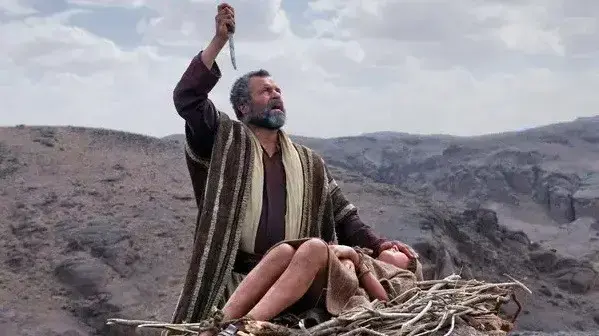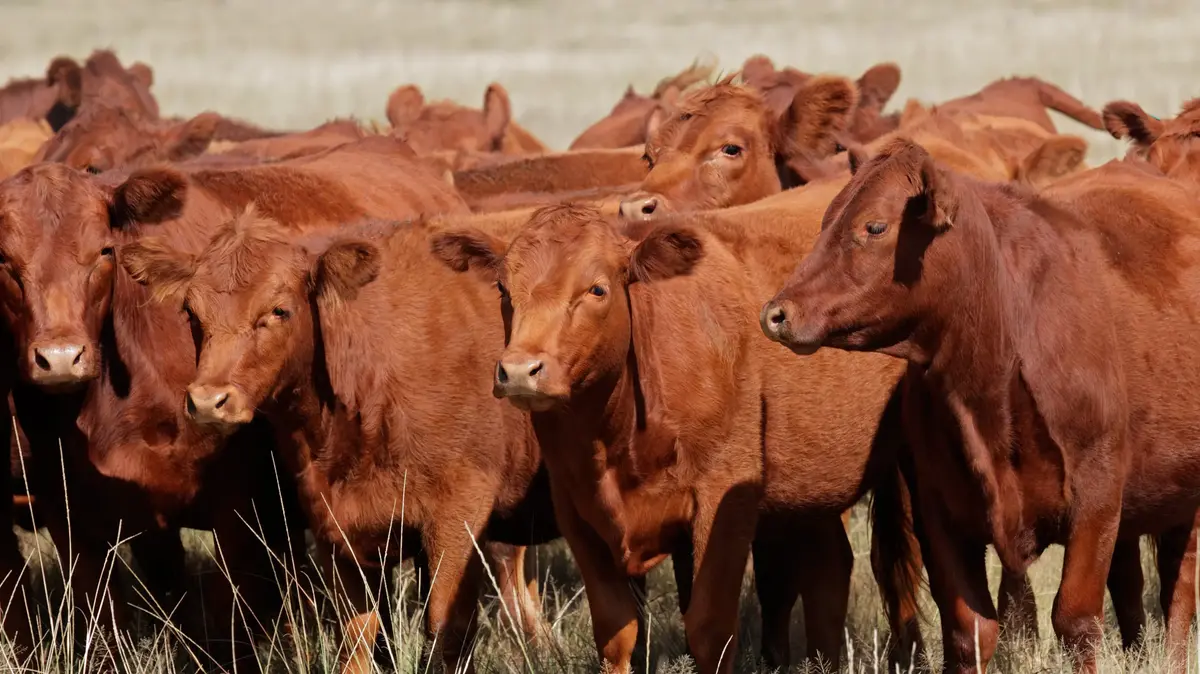The trailer for the series "The Bible" (The History Channel)
A large number of people take the Bible literally: they believe that Adam and Eve existed, Noah built the ark and put in it pairs of all the animals in the world, and that Moses was able to lead the Israelites into the divided Red Sea. But even those who treat the Bible in a way This admits that a certain degree of relativity must be exercised when it comes to the laws found in the scriptures.
There really are some rules in the Bible that seem quite extreme and impractical from a modern point of view, regardless of your beliefs, on the Ranker website they ranked the laws that seemed the strangest and wrote that "It's quite fascinating to look back at laws and rules that were sacred thousands of years ago, whether it To enrich your faith or to better understand the early stages of a major world religion."
After removing from their list laws from the New Testament and those that every Jew knows well (such as the prohibition of cooking a goat in its mother's milk) we are left with this list of laws. Some of them do you know
When a man fights another man, his wife's hand is cut off if she grabs the opponent's genitals
In the book of Deuteronomy 25, verses 11-12, it is written: "For people will come together, a man and his brother, and the wife of the one is near, to save her wife from being beaten;
And she put forth her hand, and held his hands.
What does this mean
:
Although the text is quite clear and the instruction to cut off the hand of a woman who during a fight (accidentally or on purpose) touched the genitals of a man who is not her husband is literal - this sentence, as a rule, was interpreted later More like a metaphor. Sages interpreted this as a requirement for the woman to compensate the victim with financial compensation for the shame she caused him.
More in Walla!
A selfie on a coffee bag and a special suit: what happens to the winner of Bake of Israel?
In collaboration with Cafe Landover
Did you know that?
No
Yes
130 participants
Do not sit where a menstruating woman was sitting
Women in Period.
An illustration of a woman waving her hands with a blood stain on her pants (Photo: Giphy)
In the book of Leviticus, chapter 15, it is written: "And a woman, because she is leprous, and there is leprous blood in her flesh, seven days shall be her virginity, and everything that touches her shall be impure until evening.
And everything on which you lie in her bed will be defiled;
And everyone on whom you sit will become unclean. And everyone who touches the bed shall wash his clothes and bathe in water, and be unclean until evening.
And everyone who touches any vessel, on which you sit, shall wash his clothes and bathe in water, and be unclean until the evening.
If he is on the bed, or on the vessel on which he is sitting- upon touching it: he will be defiled, until the evening."
What does this mean?
: This is also quite clear - men should not sit in the same place where a woman sat when she was on her period, because a woman during her period is considered impure.
Although to secular eyes this prohibition seems very puzzling, there are many religious people who adhere to Nida laws and there are different interpretations regarding what is allowed and what is not allowed to be done when a woman is on her period.
Did you know that?
No
Yes
132 participants
Do not wear clothes made of both linen and wool
Textiles made of wool and decorated with red and blue stripes found in Timna (photo: Israel Antiquities Authority, courtesy Israel Antiquities Authority)
According to Leviticus 19, verse 19: "You shall keep my laws - when you die, you shall not breed evil spirits, your breast shall not sow evil spirits, and in the garment of evil spirits that the devil will not come upon you
.
"
The first commandment refers to the prohibition of mating two species of animals together. This can be understood - if man creates a new species, he changes the order of Genesis and spoils the intention according to which the world was created because the Creator did not create this species and was not interested in it. A similar prohibition concerning the creation of something new that does not exist in nature - a prohibition on sowing field hybrids and preventing the mixing of seeds of different plants. But the problem begins with the third law that refers to a hybrid garment, also called a shatanz. A shatanz is a garment in which threads of wool and linen are woven together, and according to the Torah It's forbidden to wear it. It's also forbidden to sleep on a Shatanz mattress or sit on an armchair upholstered in fabric that has Shatanz in it. But why?
There is a dispute about the interpretation.
The reason for this may be that "wool and linen were intended for priests only".
Another possibility is an interpretation that claims that mixing wool and linen "raises a malignant heat that exhausts the strength".
On the other hand, some commentators put the reason for this prohibition in the first war in the world - it is the war between Cain and Abel: as you remember, Cain was the first farmer in the world, and Abel was the first shepherd.
The two wanted to sacrifice their produce to God: Abel brought sheep from his flock and Cain brought flax seeds.
According to what is told in the book of Genesis, God did not like Cain's sacrifice and did not accept it, and Cain, who was jealous of his brother, murdered him.
Therefore, these commentators believe that in order to learn a lesson and realize where hatred leads, and to remember how terrible is brotherly hatred, the Torah commanded us: "Do not wear Shatanz" - the combination of wool - which reminds Abel and his occupation as a shepherd, and of linen - which reminds Cain and our victim.
In any case, regardless of the reason, it is a serious prohibition and in the Holy Zohar (Parashat Kedoshim) it is even written that whoever wears Shatanz - a desire to murder enters into him.
Do you observe the ban on wearing shatanz?
Obviously!
I didn't know about him at all
I've heard of him but I'm not a keeper
144 participants
If your slave refuses to go free - pierce his ear
Ear piercing with a nail (photo: screenshot, Youtube)
In "Exodus" chapter 21 it is written: "And if the servant says, I have loved my master, my wife, and my children I will not go out looking for.
And his master brought him closer to God, and brought him closer to the door or to the mezuzah, and his master pierced his ear with a talisman, and his servant was forever.
What it means:
The commentators examine the implications of these verses, and claim that the mark in the ear is meant to testify to permanent servitude and the forfeiture and relinquishment of every right that exists for a free person.
There are different estimates as to whether the ear piercing was a choice of the slave or it was a form of punishment for not choosing to be free.
Of course, these laws only apply to Hebrew slaves and not Canaanites or residents, who were not given the option of choosing or going free after six years of slavery as was given to the Hebrews.
Have you heard of this law?
Obviously
No
128 participants
Women who are suspected of cheating - are forced to drink dirty water
A woman is caught cheating (Photo: Giphy)
The biblical laws about women, adultery, and water are controversial, but in the book of the wilderness it is written: "A man is a man because his wife has gone astray, and she has gone above him, and a man has lain with her, she has laid seed, and she has disappeared from the eyes of a woman, and she has hid herself from the world;
And yet there was nothing in it, and he was not caught... and the man brought his wife to the priest... and the priest took holy water, in an earthen vessel;
ְ ְ ְ ְ ְ ְ ְ ְ ְ ְ ְ ְ ְ ְ ְ ְ ְ And these bitter waters came, in your bowels, to boil your stomach, and make your thigh fall;
And the woman said, Amen, Amen."
What does this mean?
: A married woman whose husband suspects her of cheating on him and she denies it should be tested in the temple by drinking "holy water" mixed with dirt that the priest brings her.
If she cheated - the water will cause her stomach to swell and her thigh to fall, and if she didn't cheat she will continue to live in health and have children.
Some people think that the dirty water was supposed to cause a miscarriage;
Others think it was a way of putting pressure on the woman to confess her sins.
Either way, it cannot be denied that the idea was for the alleged adulteress to drink a mixture of holy water and dust from the tabernacle floor.
Did you know this law?
Yes
No, but I'm not surprised
No and I'm shocked
122 participants
You can't kill a burglar in the daytime
Burglar (Photo: ShutterStock)
In the book of Exodus 22 it is explained that "if the thief is found in the basement, and he is beaten and dies - he has no blood.
B If the sun shines on him, his blood is his: he will pay - if he does not have it, and we are sold for his theft.
C If the thief is found in his hand, the thief will be found, from an ox to a donkey to six--life: two years, he will pay."
What this means:
The important distinction here is that killing a burglar during the night is probably an act of self-defense, but if you do it During the daylight hours, this is a missed opportunity to identify and catch the thief. To this was added the assessment that a night burglary implies "murderous intent" and therefore the shedding of the burglar's blood was justified. Some of the commentators (among them Rashi) explained that this is a parable which means that killing the thief is only permitted for reasons of self-defense - Something that is currently also enshrined in legislation in Israel within the framework of the Southern Shay Law.
this law
Does not make sense
Should be today too
94 participants
Do not eat fat - or you will fall from the people
Removing fat from meat (Photo: Giphy)
In the book of Leviticus, chapter 3, it is established: "It is a universal law for your generations, in all your dwellings--all milk and all blood, you shall not eat"
What this means: First, it must be clarified that the "milk" that is forbidden to eat is any of the fatty parts of an animal that was sacrificed on the altar, that is, the milk that is forbidden to eat is only the one from the three animals: cow, sheep and goat, while the milk from the seven pure animals and fowl is allowed to be eaten.
There are many interpretations of this verse.
Some biblical scholars say that this means that you cannot eat fat from an animal intended for ritual sacrifice, because it is not appropriate for a person to eat something dedicated to God, and the Harlbaj explained that the purpose of the prohibition is to increase the dignity of the sacrifices. and the Ramban. In the Book of Education they added that, as with other forbidden foods, fat also harms the body, thus preventing the mind from acting wisely. Other commentators thought that the order was intended to "punish ourselves and harm our appetite, even for those things that many of us would probably very much like."
According to Rabbi Avraham Kook, one of the fathers of religious Zionism and the first Ashkenazi chief rabbi in Israel, one of the explanations for the permission to eat meat is to allow humanity to develop physically, and from that to ascend mentally and morally.
Since fat is not consumed for human existence, and its entire purpose is only to fulfill man's desire for luxury - the prohibition of eating it illustrates that animals should not be harmed unnecessarily.
According to Rabbi Kook, this prohibition, along with the other laws of the Torah on eating meat, was intended to uplift humanity over the generations to distance itself from eating meat and to adopt a lifestyle of a vegetarian diet.
Prohibition of eating fat
A law that is needed even today
Undemocratic law
80 participants
Make sure no one falls off your roof
A woman falls from the roof of a house (Photo: Giphy)
The instruction from Deuteronomy chapter 22 includes a statement regarding the building of a house: "For you shall build a new house, and make a railing for your roof;
And you shall not put blood in your house, for that which falls from it
shall
fall." In a very important law that according to the Rambam is included as one of the seventeen mitzvot in the laws of a murderer and the preservation of the soul.
Rabbi Natan stated that this mitzvah must be understood that it is also forbidden to raise a dangerous dog inside the house, nor to place a rickety ladder in the house, and that every person must remove all obstacles in his house.
Have you heard of this law?
No
Yes
93 participants
Do not eat owls
Owl GIF (Photo: Giphy)
In the section, I will have a discussion of the forbidden birds and written there: " I have to do it.
What it means:
The Bible forbids us to eat many things, but it really, really doesn't want us to eat owls. It's very specific: don't eat owls, don't eat little owls, don't eat big owls, and don't eat any bird that resembles an owl. But why?
Researchers say this is because the owls are considered "rough eaters, scavenging on meat or waste and therefore spoiling their taste".
They are also "voracious and cruel, delighting in night and darkness and feeding on unclean things."
From this they concluded that the meat of birds that eat "things from the plant" is allowed to be eaten.
Would you eat an owl?
No way?
It is forbidden
No way?
That sounds disgusting
I would try
82 participants
A child who does not listen to his parents - is executed
They forgot me at home (Photo: Giphy)
According to the book of Deuteronomy, chapter 21: "For a man will have a rebellious son and a teacher who will not listen to the voice of his father and the voice of his mother, and they will reject him and he will not listen to them.
I have to do it
. While disobeying and disrespecting his father and mother, and behaving with excessive hedonism - gobbles up food and gets drunk - according to the Torah, in this situation his parents can bring him to the elders of the city, and he is sentenced to be executed by stoning.
Sages narrow down the case to a 13-year-old male boy, who in his pleasure also steals the meat and wine from his parents, which he 'guzzles and devours'. In addition, Sages explain that the reason for this killing is to prevent him from committing more serious acts in the future.
According to the Talmudic discussion and the Halacha, so many conditions are required for such a situation to be possible that allows for the death to be discussed, so that the case is extremely rare and some have even claimed that it "never was and will not be".
A disobedient son and teacher - dies
It's Horrible
That's how it was then
82 participants
Do not mention the names of other gods
Jesus and the Indian God Vishnu in "Family Man" (Photo: Giphy)
According to Exodus 23: "And in all that I have said to you, you shall observe;
And the name of other gods you shall not mention, it shall not be heard on your lips."
What does this mean
: This is simply an instruction to the believers to ignore the names of all the other gods. In fact, they were not even allowed to say these names. Some scholars interpret this as "never mention them but In abhorrence."
Rashi even added that it is forbidden to hear other people mention the names - that is, it is forbidden to do business with gentiles who swear by their gods.
According to the Sanhedrin, the punishment for saying the names of other gods is flogging.
Have you heard of this law?
No and I sin
Yes.
But I don't keep it
Yes and I am righteous
68 participants
Grapes that have fallen should be left on the ground for the poor to eat
Wine vineyards at Pinto Winery in Yeruham (Photo: Ziv Reinstein)
על פי ויקרא פרק י"ט": "כַרְמְךָ לֹא תְעוֹלֵל, וּפֶרֶט כַּרְמְךָ לֹא תְלַקֵּט: לֶעָנִי וְלַגֵּר תַּעֲזֹב אֹתָם, אֲנִי יְהוָה אֱלֹהֵיכֶם".
מה זה אומר: זה אמנם נראה די פשוט, אבל יש פה כמה ניואנסים. אין הכוונה רק לתת לעניים לאכול ענבים שנפלו, אלא "אם פחות משלושה ענבים נמצאים על הגפן או על האדמה לאחר בציר הכרם שלך, צריך לתת לבני ישראל העניים או לזרים שאינם יכולים להיות בעלי אדמות בישראל לקבל אותם".
ביהדות יש חיוב על פי ההלכה להשאיר בשדה חלק מהיבול לעניים. רוב החיובים במתנות עניים אגב חלים רק על בעלי שדות. אגב, לגבי מתנות עניים בימינו יש מחלוקת. עקרונית רב ששת קבע שאין להשאיר יותר מתנות לעניים כיוון שגנבים או פרחחים יכולים לגזול אל התבואה. ישנם משקים ביהודה ושומרון שנוהגים היום גם כן להשאיר מתנות - אבל מודיעים לעניים על כך, שילכו לקחת בטרם יקרה לסחורה משהו.
מצוות לקט שכחה ופאה
מכיר אבל לא שומר
לא שמעתי עליו
מכיר ומקפיד
74 משתתפים
אסור להשאיר בורות פתוחים שבעלי חיים עלולים ליפול לתוכם
פרה שנפלה לבאר(צילום: צילום מסך, Facebook)
בספר שמות כ"א 34-33 נאמר: " וְכִי-יִפְתַּח אִישׁ בּוֹר, אוֹ כִּי-יִכְרֶה אִישׁ בֹּר--וְלֹא יְכַסֶּנּוּ; וְנָפַל-שָׁמָּה שּׁוֹר, אוֹ חֲמוֹר - בַּעַל הַבּוֹר יְשַׁלֵּם, כֶּסֶף יָשִׁיב לִבְעָלָיו; וְהַמֵּת, יִהְיֶה-לּוֹ."
מה זה אומר: זה אולי נשמע מוזר בימינו, אבל זה בעצם רק אומר לכסות את הבארות שלך (או כל חור גדול אחר שבאדמה שלך) - מכיוון שבעלי חיים נוטים ליפול לתוך חורים עמוקים באדמה, ואם יש מים בתחתית החורים העמוקים האלה, סביר להניח שהם יטבעו. היה וקרה מקרה שכזה, על בעל האדמה בה היה הבור לשלם כסף לבעל החיה המתה ונבלת הבהמה המתה תהייה שייכת לבעל הבור לאחר ששילם לבעל הבהמה את מחירה של בהמה חדשה.
אם כלב היה נופל לבור בחצר שלכם ומת - הייתם משלמים עליו לבעלים שלו?
Obviously.
That's right
No way?
This is the owner's responsibility
82 participants
news
not to be missed
Tags
The Bible
Bible
Bible
went
rules















